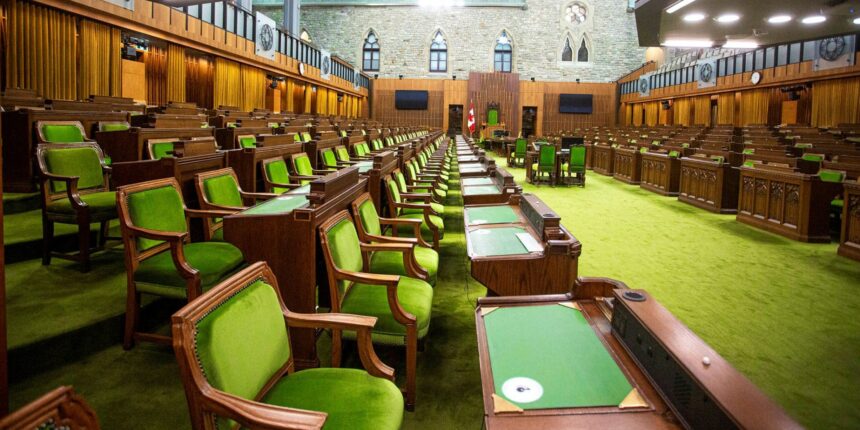As Ottawa enters its fourth day of parliamentary deadlock, the unmistakable signs of political crisis are etching themselves into the faces of MPs hurrying through Centre Block corridors. What began as procedural wrangling has morphed into what some veteran observers are calling “constitutional chicken” – with neither the government nor opposition showing signs of backing down.
“We’re witnessing the logical conclusion of years of deteriorating parliamentary decorum,” explains Dr. Samantha Chen, governance specialist at Carleton University. “This isn’t just about the immediate policy dispute. It’s about fundamental questions of how our democratic institutions function under pressure.”
The crisis ignited Monday when Opposition Leader Michael Barrett introduced a rare privilege motion challenging the government’s handling of confidential security documents. By Tuesday afternoon, the Speaker found himself unable to maintain order as shouting matches erupted across the aisle. Yesterday’s unprecedented eight-hour filibuster in committee only deepened the parliamentary paralysis.
I spent yesterday afternoon in the public gallery, watching as decades of political convention seemed to crumble in real time. The usual parliamentary theatre had given way to something more raw and consequential. Several MPs I’ve known for years appeared genuinely shaken by the escalation.
“There’s a line between robust debate and institutional damage,” said Toronto MP Yasmin Rahman, speaking briefly between votes. “I worry we’ve crossed it, and Canadians will ultimately pay the price.”
The timing couldn’t be worse for the government. With inflation still pressing household budgets and the Bank of Canada signaling another possible rate adjustment, Parliament’s focus has shifted entirely to internal procedural battles rather than economic concerns. A Léger poll released this morning indicates 72% of Canadians disapprove of how all parties are handling the situation.
Behind closed doors, negotiations continue. Sources within the Prime Minister’s Office, speaking on condition of anonymity, indicate that compromise proposals have been floated but rejected. “There’s a genuine desire to find a path forward,” one senior advisor told me, “but the trust deficit is massive right now.”
The political calculation appears especially complex for the government. With by-elections scheduled in three competitive ridings next month, any perception of constitutional overreach could prove costly. Conservative strategists sense opportunity in prolonging the crisis, with one party insider telling me they’re “prepared to hold the line indefinitely.”
What makes this standoff particularly concerning is how it’s playing out across Canada’s regions. Provincial premiers from both ends of the political spectrum have begun weighing in, further complicating resolution efforts.
“When Ottawa becomes this dysfunctional, it reinforces every negative stereotype about federal politics,” said former parliamentary clerk Thomas Mulvey. “The damage to public trust extends far beyond whatever policy disagreement started all this.”
In Winnipeg yesterday, I spoke with voters at a community forum about the parliamentary meltdown. Their responses reflected more resignation than outrage. “They’re all the same when it gets down to it,” said retired teacher Margaret Friesen. “They forget we sent them there to solve problems, not create new ones.”
The legislative consequences are already mounting. Twelve bills now sit in procedural limbo, including time-sensitive funding measures for infrastructure projects in New Brunswick and British Columbia. Parliamentary Budget Officer Matthieu Giroux has warned that continued delay could trigger contracting penalties costing taxpayers upwards of $175 million.
Constitutional experts remain divided on how the crisis might resolve. University of Toronto law professor Alexandra Park suggests the Governor General could theoretically intervene in extreme circumstances, though such a move would be unprecedented in modern Canadian history.
“We’re in uncharted territory,” Park notes. “The written rules only take us so far. At some point, someone has to blink first, or we risk damage to institutions that transcends any single parliamentary session.”
For younger MPs experiencing their first major parliamentary crisis, the experience has been particularly jarring. First-term Liberal MP Jason Cheng admitted feeling “completely unprepared” for the intensity of the conflict. “They don’t cover this in orientation,” he said, attempting a half-smile between procedural votes.
As Parliament Hill staff work overtime to manage the logistics of prolonged sessions, questions about sustainability loom. Security personnel are on extended shifts, translation services are stretched thin, and the Parliamentary Restaurant has begun offering midnight meals for the first time since the pipeline debates of the 1960s.
What happens next remains uncertain. The government could prolong summer recess to cool tensions, though that strategy carries its own political risks. Opposition parties have scheduled coordinated rallies in major cities this weekend, suggesting they see public advantage in maintaining pressure.
Meanwhile, crucial policy files gather dust. Canada’s international commitments, including climate targets and defense spending promises, face potential delays that our allies are watching with growing concern.
As one senior diplomat told me yesterday, “Parliamentary democracies always have their dramas, but when basic governance functions seize up, it affects everything from treaty implementations to investment confidence.”
For now, Canadians wait and watch as their political representatives remain locked in a struggle that increasingly looks like it has no winners – only varying degrees of institutional damage. The question isn’t just who will wave the white flag first, but whether our parliamentary system will emerge intact when the dust finally settles.






